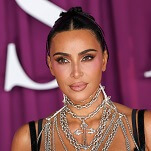That’s what happens to Shirin after she ends things with Maxine (Rebecca Henderson) early in the movie. Akhavan then follows Shirin as she tries to pick up the pieces (and/or win back her ex through sheer confrontational stubbornness) while flashing back to various stages of the relationship, from the first blush of mutual Brooklyn hipster hatred at a New Year’s Eve party to their fights about identity politics. Shirin is bisexual and not out to her Iranian-American family. This rankles Maxine, who identifies as gay and doesn’t see why she should have to suffer through dopey excuses about why they share a bed—explanations that involve economics, vague allusions to Europe, and the movie Beaches.
The distinct ring of Akhavan’s voice brings to mind Lena Dunham’s Girls, on which Akhavan will be appearing in its just-begun fourth season. But the movie’s structure as a relationship post-mortem owes more to Annie Hall, only without anyone assuming the Diane Keaton role. Instead, the couple divides up Alvy Singer behavior: Shirin claims the sardonic self-loathing while Maxine takes the prescriptive, serious-minded book-buying. Akhavan gets a big laugh early on when Shirin earnestly describes how she and Maxine qualify as an “it couple”—yet despite Akhavan’s recognition, as a filmmaker, of the hubris of that statement, she still over-inflates the importance of the relationship, building too much of the narrative around the dull Maxine. It’s a self-defeating choice because apart from being “the same kind of stoned person,” Shirin and Maxine appear incompatible—and not in a charmingly mismatched way, either. Maxine seems humorless and judgmental from more or less the first scene, and Henderson isn’t given much opportunity to reveal hidden depths.
Most of the other characters Shirin bounces off of appear too briefly to get much development, yet her relationships with just about everyone else on-screen—her best friend (Halley Feiffer), her straight-arrow brother (Arian Moayed), her worried parents, the kids she teaches at an afterschool program—are more interesting than her dynamic with Maxine. This extends even to bit players, like the people she meets during a particularly fumbling sexual encounter that manages to be awkward, sexy, and piercingly lonely all in the span of a few minutes.
This scene and plenty of others, like the one where Akhavan cross-cuts between Shirin badmouthing her brother to their father in the guise of concern and her brother doing the exact same in front of their mother, show a lot of talent behind the camera. And Akhavan is winningly deadpan in front of it. Ultimately, Appropriate Behavior works almost in spite of itself; so efficiently does the film explain why Shirin and Maxine split up that eventually it lags behind its own premise. It also explains, with equal succinctness, why Akhavan is a triple threat to watch.







































